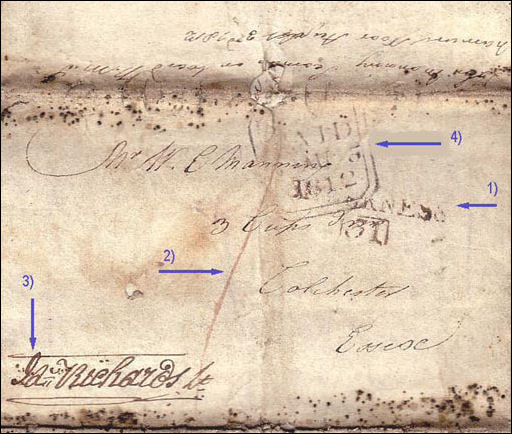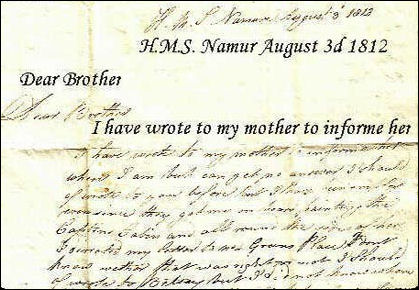[Eunice and Ron Shanahan have shared with readers of the Victorian Web this material from their website, Letters from the Past. Click on thumbnails for larger images.]
 This
has to be one of the least promising-looking letters I have had for a while.
It is rather scruffy, with all kinds of stains on the outside. However,
the inside of the letter is much cleaner and the ink is as good as when it
was written nearly 200 years ago. It was written by John Manning on the H.M.S.
Namur, a vessel of 90 guns and a guardship at Sheerness, to his brother
Mr. W. C. Manning, 3 Cups Inn, Colchester Essex.
This
has to be one of the least promising-looking letters I have had for a while.
It is rather scruffy, with all kinds of stains on the outside. However,
the inside of the letter is much cleaner and the ink is as good as when it
was written nearly 200 years ago. It was written by John Manning on the H.M.S.
Namur, a vessel of 90 guns and a guardship at Sheerness, to his brother
Mr. W. C. Manning, 3 Cups Inn, Colchester Essex.
Sheerness is a port on the Isle of Sheppey, in the Thames estuary, but actually at the mouth of the River Medway. It was a garrison town and naval seaport, built in the 17th century under the orders of Charles II, when Samuel Pepys was Secretary to the Admiralty. It served as a naval port until 1960. There is more information on this website.
The postal markings
- SHEERNESS 51 boxed mileage mark showing that it was 51 miles from the GPO in London, for charging purposes.
- a red manuscript '1' to show it was paid one penny. This was a concession rate for serving seamen and soldiers. This was only available to 'other ranks', and the concession was only approved on certain conditions — it had to be prepaid, and had to be made out correctly, the letter must only concern the writer's personal concerns, and from 1806, he had to be within His Majesty's Dominions, which included Britain.
- the signature on the bottom left of Jas. Richards Lt. I think this is to show that the officer has confirmed that the conditions had been met. There is also a note across the fold, "John Manning Seaman on board H.M.S. Namur Noar August 3rd 1812", which explains to the post office clerk who/why he is claiming the penny postage. This was a real benefit to the serving men, as the postage in 1812 had been increased from 6d to 7d for a letter being carried between 50 and 80 miles.
- The London Paid Tombstone morning duty date stamp AUG 5 1812.
The Letter

The letter itself is very interesting, the spelling is somewhat erratic, and there is very little punctuation, but, for a seaman at this time, I am surprised he was able to write as well as he did. I have transcribed it as written. He begins:
Dear Brother,
I have wrote to my mother to informe her where I am but can get no answer I should of wrote to you befor but I have been employd ever since they got me on board painting the Captin's cabin and all round the sides of her I directed my letter to no 4 Greens Place I don't know wether that was right or not. I should of wrote to Betsy but I did not know where she lived neither Mary. I will take it as a favour if you will informe me where either of them live as I want to write to them for some writing paper and pens likewise a little ink as I can get none hear I don't want for them to pay for it out of their pockit for I can pay them again when I come ashore.
Note:I was surprised to see this use of 'should of' instead of ''should have', as it is something I hear frequently nowadays, and had no idea it was in use so long ago. As he wrote that he was painting the cabin, and the ship, it seems he was a tradesman.
The next part is a wonderful example of actual life onboard the ship, and is not what I have read of the dire conditions on many ships at this time, but he is critical of the supplies of beer and tobacco.
I rather expect they mean to keep me on board of this Ship if they do I expect I shall be on Shore again in about six months I have been on board of this ship going on of 6 weeks now and the Captin has only been on board once since, that was when I first came or else they would of spoke to him about my being on this Ships books the Lieutenant and all the officers are very much pleased with my work and very much respect me if I should be fortunate enough to belong to the Ship I shall be as happy as if I was on Shore for it is very good living we have nothing to drink but grog and wine. There is beer in the Ship but they sell it very dear seven pence pr pot and when you get it is not so good as table beer you get ashore. They sell the tobacco at five pence pr ounce which you can get better ashore for 2 pence and you know I like to smoke a pipe of tobacco very well, more so now I have nothing to do with watching nor any other work but my own. I can go to bed any time I like after 8 O Clock at night and lay till 6 or 7 in the morning and I don't know what it is in a seagoing Ship but I am told it is better so I don't know what fault our brother Robert could find I have been to all the receiving ships the same as he was and I found them all very good
Note: This refers to the fact that this is a Guard Ship and in effect not a sea-going ship. It was anchored in the Thames Estuary, near the Nore sandbank and was used to keep an eye out for smugglers, spies from the Continent, and any foreign shipping. Maybe that was why the Captain was not on board all the time.
I am informd he was on board of the Princess Caroline she was laying at Portsmouth the 22nd July I don't now rightly know wether she is there or not now I did not know myself until this last week as I happend to catch hold of the above paper. I hear by different people there is great talk of peace in London but it is no such a thing for they have sent several small vessels out to different of HMS to tell them to stop all the Americans.
Note: This is a reference to the American war going on from 1812. This was a result of Napoleon stirring up the Americans against the British. In 1812, in retaliation for Napoleon's Berlin Decrees against British commerce, the British had passed Orders in Council to prohibit neutral ships from trading with France, which banned the American vessels, and war was the result.
when you write you might let me know a little how things go on. Please to give my kind love to my Mother when you write likewise to my brother and Sister and except the same yourself so I conclude and remain your affectionat brother John Manning.
He then adds a note, which explains the postage ruling, showing that the penny postage was also applicable going to the seaman as well as from him, providing he was on board a vessel within the Dominions.
Direct for me John Manning Seaman on Board H.M.S. Namur at the Noar please to pay one penny and it will come the same as this to you Excuse hast J.M. For I am in Hast
The Nore anchorage was much used by the English fleet in the wars of the 17th and 18th centuries. In 1797 sailors at the Nore mutinied against their conditions, and their leader, Richard Parker, was hanged from the yard-arm of his ship. From the contents of this letter it seems conditions had improved. It gives such a picture of this seaman's life at this time — better than any history text book.
References
Alan Robertson, The "Ship Letter" Ports of the Thames Estuary
Oman: History of England.
24 March 2007